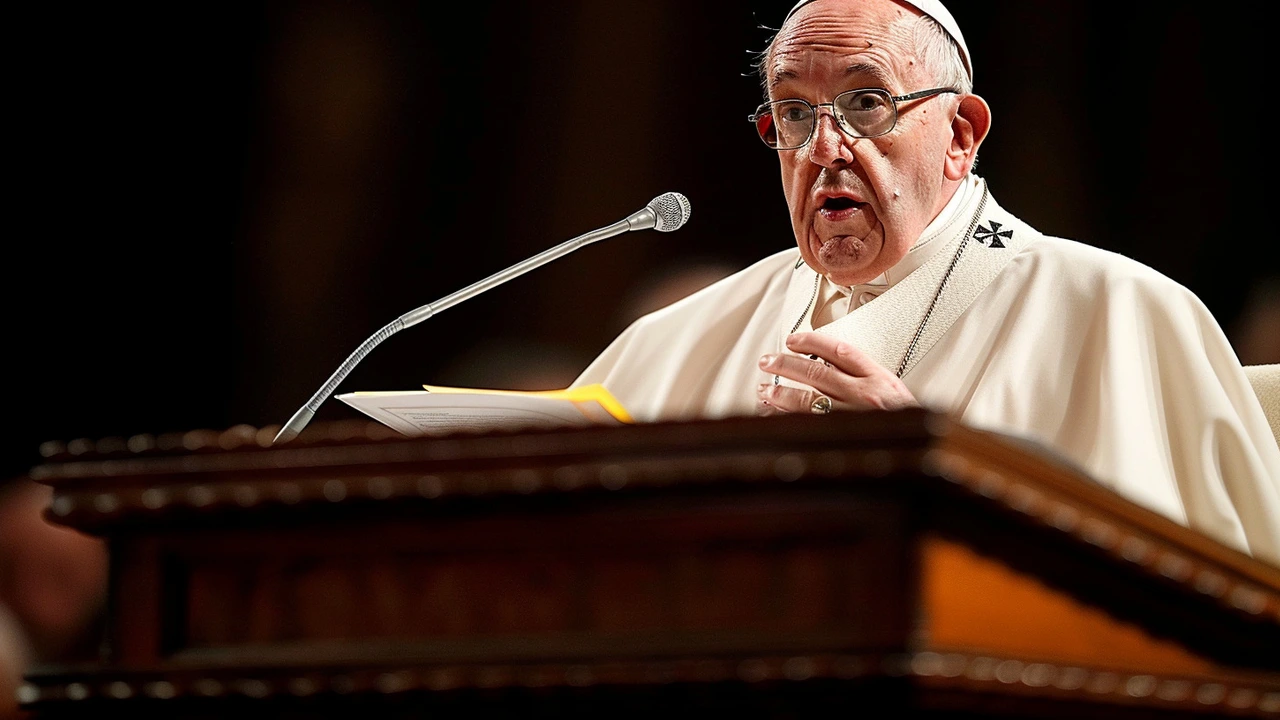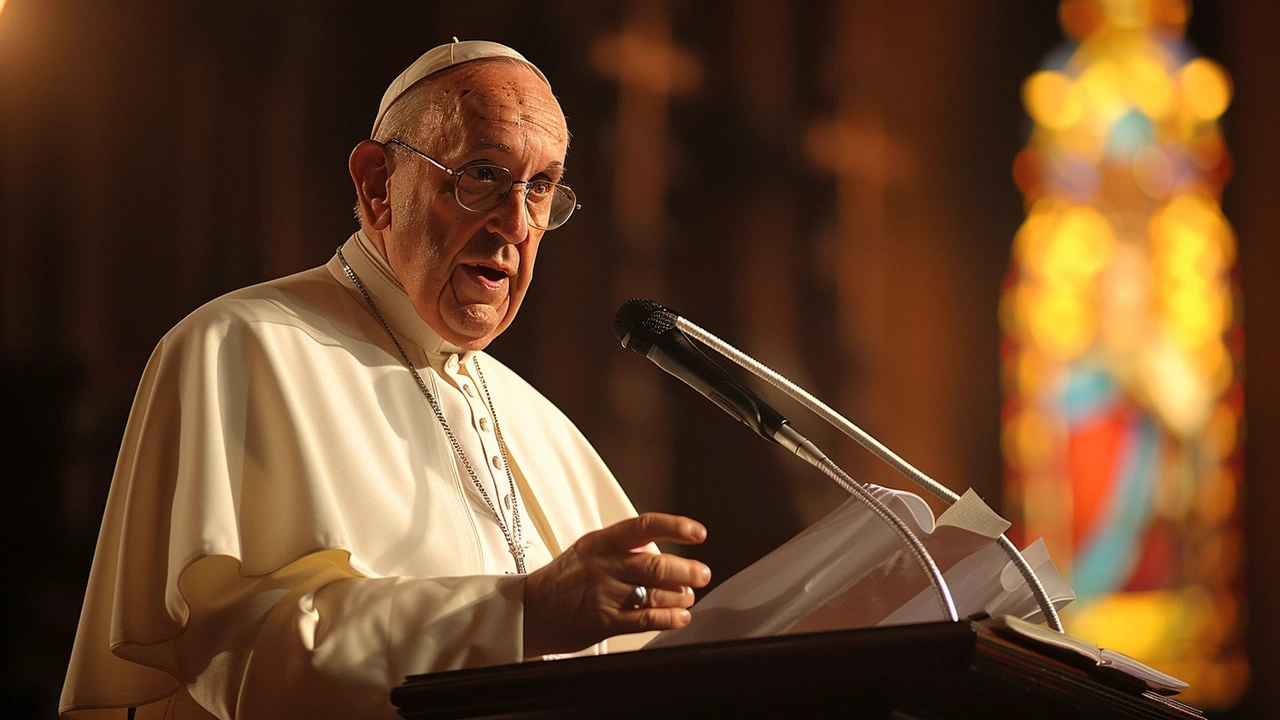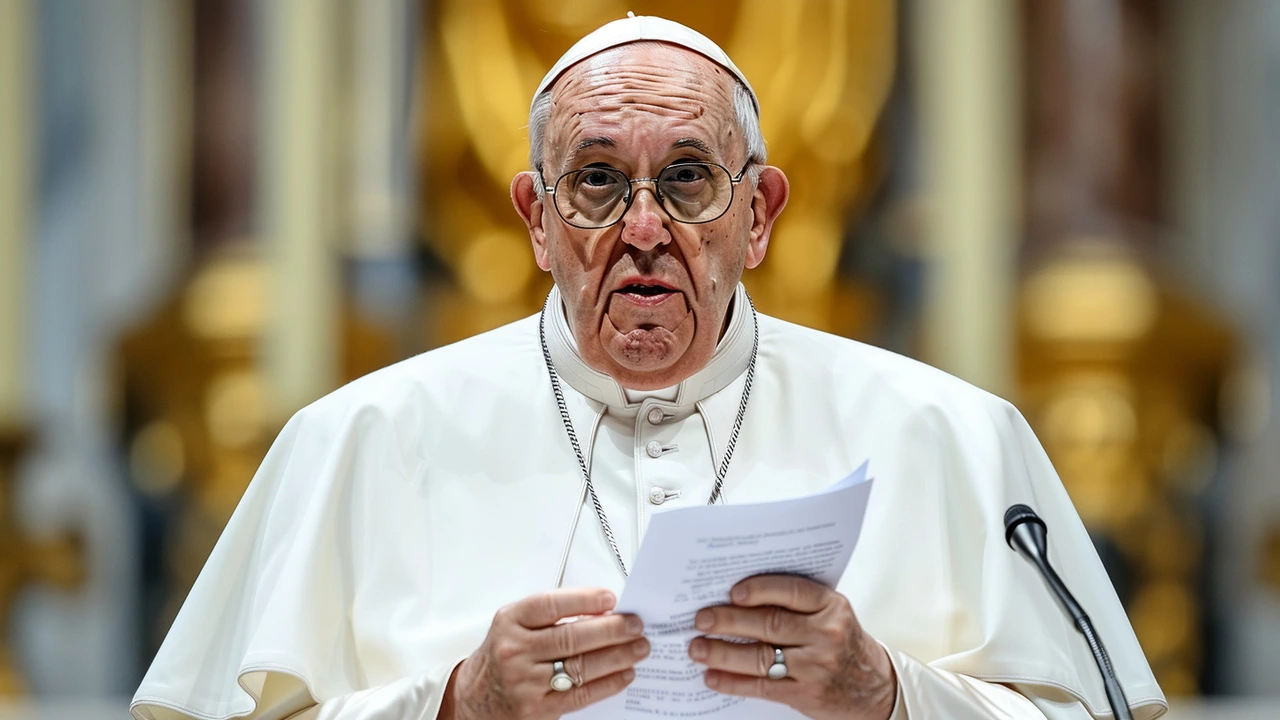Pope Francis Apologizes for Homophobic Slur Amidst Controversy Over LGBTQ+ Stance

In World News
Pope Francis at the Center of Controversy Over Homophobic Slur
Pope Francis has found himself in the midst of a swirling controversy after using a highly offensive homophobic slur during a private meeting with Italian bishops. The term 'frociaggine,' which translates disparagingly to 'faggotness,' was employed by the Pope to articulate his firm opposition to admitting gay men into Catholic seminaries. According to reports, Pope Francis suggested that an air of 'frociaggine' already exists in certain seminaries, proposing that gay men should be barred from training for the priesthood. This statement has ignited a significant backlash, particularly among LGBTQ+ Catholics and their allies.
In response to the uproar, the Vatican swiftly issued a statement explaining that the Pope had not intended to cause offense with his choice of words. The statement expressed regret towards individuals who were 'hurt by the use of a word,' acknowledging the sensitivity surrounding such terms. Despite this public apology, the incident has rekindled ongoing debates and criticisms regarding the Catholic Church's stance on LGBTQ+ issues and its commitment to inclusivity.
Unexpected Slur Amidst Steps Towards Inclusivity
What makes this incident particularly shocking is its contrast to Pope Francis' frequent public expressions of respect and inclusivity towards the LGBTQ+ community. The Pope has previously made headlines for his seemingly progressive views, including his suggestion that priests might have the discretion to bless same-sex couples under certain circumstances. Just recently, he reaffirmed the Church's prohibition of gay priests, sparking further discussion. Consequently, the use of an offensive slur in a private setting has been seen as a significant and disappointing misstep, creating a dissonance between his public rhetoric and private comments.
Supporters of the Pope have tried to downplay the gravity of the incident, attributing his occasional missteps in Italian colloquialisms to his upbringing. Pope Francis was born in Argentina to Italian immigrant parents, and his primary language is Spanish. However, this explanation has not satisfied all critics, many of whom believe that the reported comments reveal deeper, more systemic issues of anti-gay bias and institutional discrimination within the Church. Critics argue that such comments undermine the Pope's credibility as a leader advocating for greater inclusivity and respect for all individuals, regardless of sexual orientation.

Reactions from the LGBTQ+ Community
Among LGBTQ+ Catholics and their allies, the reaction to Pope Francis' comments has been one of profound disappointment and anger. Many individuals have expressed feeling betrayed by a leader they had hoped might usher in a more accepting era within the Church. For years, the Pope's seemingly progressive statements had provided a glimmer of hope that the Catholic Church might begin to shift its traditional stance on LGBTQ+ issues. However, incidents like this one have made it clear that significant challenges remain.
Prominent LGBTQ+ advocates have called for the Pope to take more substantial actions to address the underlying issues of discrimination and exclusion faced by LGBTQ+ individuals within the Church. Some have suggested that simply apologizing for offensive language is not enough; they argue that the Pope needs to demonstrate a genuine commitment to fostering a more inclusive and supportive environment for all believers. This would require not only changes in rhetoric but also concrete policy changes and reforms within the Church’s seminaries and institutions.
The Broader Implications
The incident involving Pope Francis’ use of a homophobic slur goes beyond merely being a momentary lapse in judgement. It speaks to deeper institutional issues within the Catholic Church that continue to impact its followers around the world. LGBTQ+ individuals within the Church often face significant challenges, including exclusion, discrimination, and condemnation. While Pope Francis has made some strides towards creating a more inclusive Church, there is still a long way to go.
For instance, many Catholic institutions still strictly adhere to doctrines that do not accept LGBTQ+ relationships or identities, creating a hostile environment for members of the LGBTQ+ community. This can lead to high levels of stress, mental health issues, and feelings of isolation among LGBTQ+ Catholics. The Church’s stance on these issues has often been a source of pain and conflict for believers who are trying to reconcile their faith with their identity.
The recent incident has also sparked wider societal discussions about the role of religious institutions in perpetuating or challenging societal norms and biases. Some argue that religious leaders, including the Pope, have a responsibility to lead by example, promoting messages of love, acceptance, and respect for all individuals. Others believe that significant changes are needed within the institutional structures of the Church to ensure that its doctrines and practices are truly inclusive.

What Happens Next?
As the dust settles from this latest controversy, all eyes are on Pope Francis and the Vatican to see how they will respond. Will there be further steps taken to address the underlying issues brought to light by this incident? Will the Church take concrete actions to ensure a more inclusive environment for LGBTQ+ individuals? These are questions that remain unanswered, but the pressure is undoubtedly on for the Pope to take meaningful action.
For many LGBTQ+ Catholics and their allies, the hope is that this incident might serve as a catalyst for broader conversations and reforms within the Catholic Church. There is a desire for the Church to go beyond apologies and take concrete steps to create a more welcoming and accepting environment for all individuals, regardless of their sexual orientation.
Ultimately, this incident serves as a stark reminder of the challenges that still exist within the Catholic Church pertaining to LGBTQ+ issues. While Pope Francis has made some strides towards greater inclusion, there is still much work to be done. It is now up to the Pope and the Church as a whole to show that they are willing to take the necessary steps to create a truly inclusive and respectful environment for all believers. As the world continues to grapple with issues of discrimination and exclusion, the actions of one of the most influential religious leaders in the world will undoubtedly resonate far and wide.
Write a comment